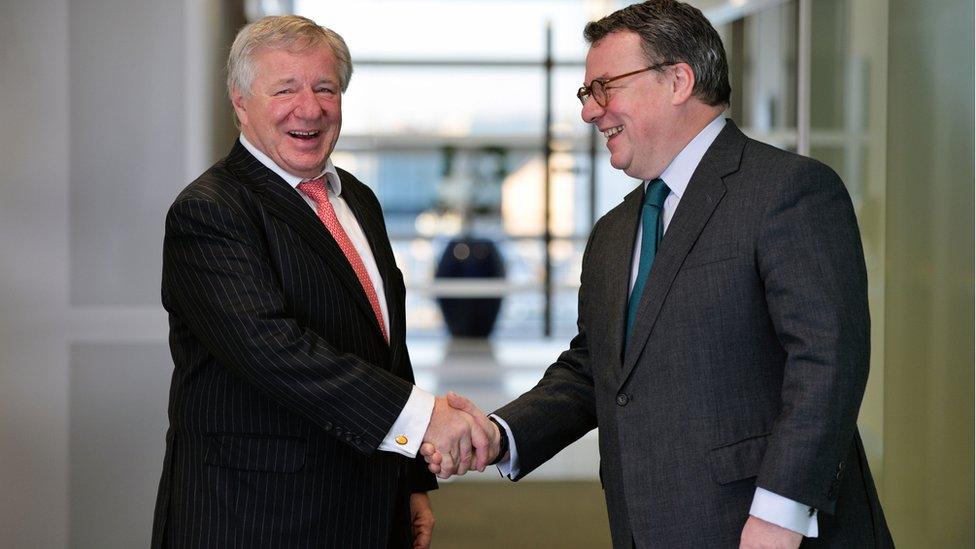SL-AAM Dunk: Raising the Aberdeen Standard and the £5.5m job share
- Published

Martin Gilbert, from Aberdeen Asset Management (L) and Keith Skeoch, from Standard Life
On Saturday, it began with a media leak. Then confirmation that talks were under way. Monday morning brought the announcement that the deal has been done, and it is now being recommended to shareholders.
Standard Life, based in Edinburgh, and Aberdeen Asset Management, the second biggest Scottish fund manager, are on the way to merger. This is a big deal for the companies, and for the Scottish economy.
Is there a break clause, the chief executives were asked? The answer: no-one is backing out.
The big shareholders have already given their approval, including Lloyds Banking Group with 10% of Aberdeen shares. Standard Life has an unusually large body of small-scale investors, having de-mutualised only 11 years ago, with each customer having a stake.
Both sides of this deal are relaxed about the obstacles ahead, before getting to full merger in the third quarter of this year.
While the headquarters is to be in Scotland, one of the questions still to work out is what the merged firm will be called.
"Aberdeen Standard Asset Life Management" seems a bit of a mouthful, and possibly misleading people into thinking it's a life coaching business. SL-AAM is an acronym that might send the wrong messages.

Brand is very important to these companies. The words, the logos and the colour carry a lot of the trust on which the sector depends and vast sums are pumped into promoting them, from Aberdeen's racing yachts to the shirts for the forthcoming tour by the British and Irish Lions.
They're going to get the experts in to decide on future branding, because it's more than choosing some names that reach a compromise between the two partners.
Standard Life will remain the brand for asset management. The group name is expected to have a bit of both Standard and Aberdeen in it, they say, vaguely.
The investment arm might be something like Aberdeen Standard Life Investment Managers, suggests Martin Gilbert. But the acronyms will be carefully checked to avoid any offence, when translated into other languages.
The two chief executives - Keith Skeoch and Martin Gilbert - spent the morning of their big announcement taking media questions in a conference call, reassuring investors, then flying north to Edinburgh to brief staff in both companies' offices.
"We're a people business," they both emphasise. "We want to tell our people first."
That's in response to repeated questions about the key rationale for the deal - that they can boost earnings by cutting costs. A cut of £200m represents slightly less than a third of Aberdeen's cost base, and it has 2,700 staff.
Standard Life has 6,500, of whom 5,000 are in Scotland.
The obvious places to start cutting, due to duplication, are in information technology, sales and back office, and those jobs are overwhelmingly in Scotland.

The two chief executives say they never talk business at the riverside
But the corporate word is that it's far too early to be talking about the detail of where that cost-cutting axe might fall. It is expected to take three years to work through. And meanwhile, the watchwords are "growth, innovation, greater efficiency".
The bosses are upbeat about prospects. They list the classes of investment fund in which they can now boast a world-class presence.
Much of the commentary around their deal has been about Aberdeen Asset's relative weakness. In four years, it has seen about £100bn of funds flowing out, as clients go elsewhere.
There's been a net outflow for 15 quarters. Martin Gilbert is hopeful of a turnaround in its emerging markets portfolio.
They also want to counter talk of being in trouble due to their focus on active management of funds. That's as opposed to the passive management, where funds are left to track the market.
The Scottish firms invest heavily in research to get ahead of the market. That's costly, and it is being undercut by low-cost passive funds. The chief executives point out that they also have substantial passive funds.
The two men, soon to become a job share, are different types of leader, admits Skeoch - but complementary, just like the deal, he adds.
Executive pay
Skeoch is the analytical economist - Gilbert the accountant, lawyer, and salesman. They say they've been friends for decades, with a bond built on their fishing trips together - mostly on the Tay, they told me, and sometimes on the Tweed.
No, they respond to questions, this deal was not hatched on a salmon beat. They say they don't talk business by the riverside. But it meant they didn't have to spend long getting to know each other when talks began in the first week of January.
So what about chief executive earnings?
Both saw their total pay packets harshly cut back last year - Martin Gilbert by 35%, Keith Skeoch by 20%.
They won't get much sympathy, given that the Aberdeen boss trousered £2.8m, the lowest since 2009 and following shareholder disapproval of past pay-outs.
The Standard Life boss was paid £2.75m for last year. In the boom times for investment performance, both have had years of more than £5m.
So will they share the chief executive's emolument, or both retain their current pay scale? That's for our remuneration committee to decide, both answer.
- Published6 March 2017

- Published4 March 2017
